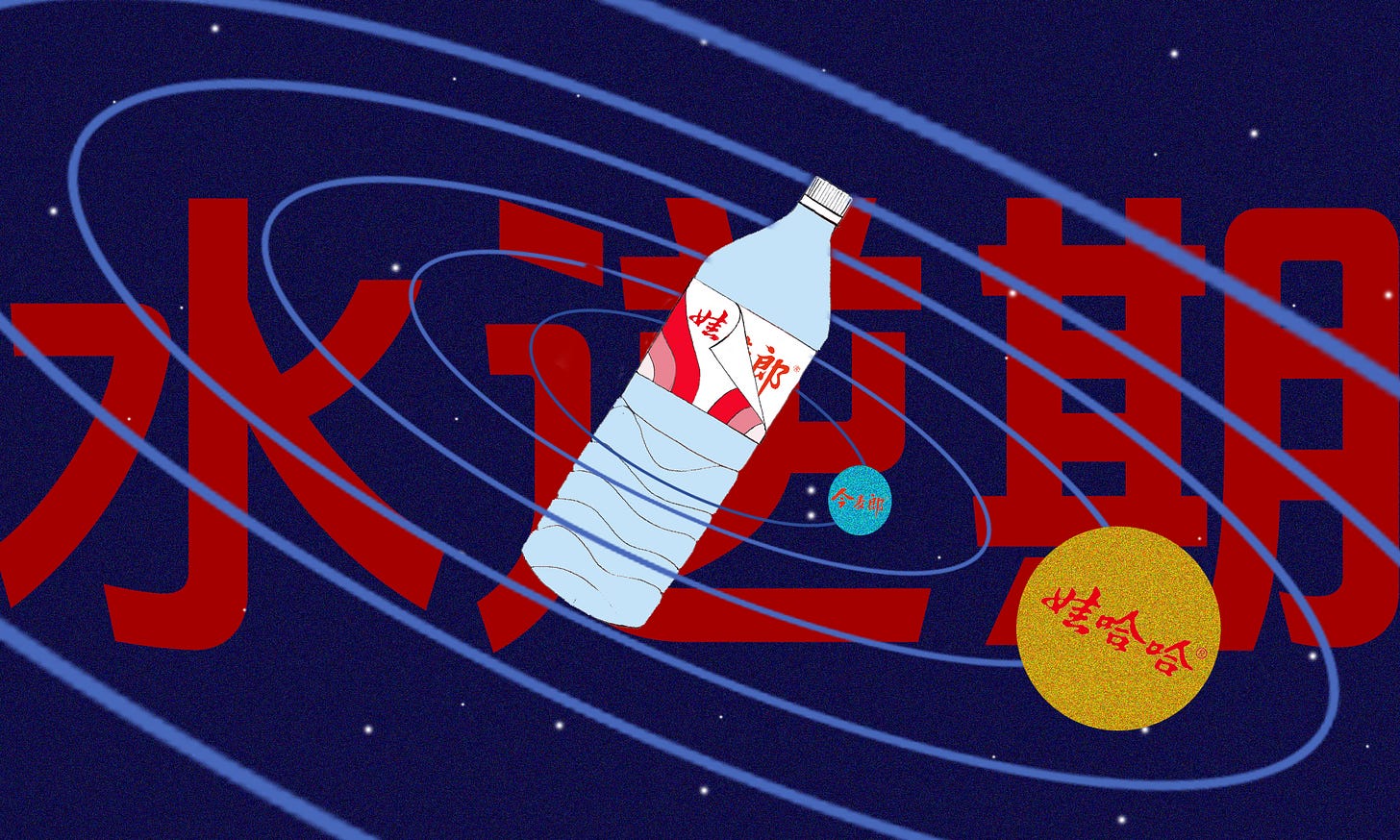"A period of bad luck" — Phrase of the Week
One of China’s biggest beverage brands experiences yet another set back

Our phrase of the week is: "a period of bad luck" (水逆期 shuǐ nì qī)
Context
In early May, images of Wahaha (哇哈哈) bottled water began circulating on Chinese social media. Photos revealed fine print on the labels indicating they were produced by another beverage brand, Jinmailang (今麦郎)—a major player in China's bottled water market.
Outsourcing is common in China's beverage industry, with companies often engaging “OEMs” (Original Equipment Manufacturers) to produce their products. However, these partnerships are typically formed with non-competing manufacturers. The controversy surrounding Wahaha’s OEM relationship with Jinmailang is because Jinmailang is a direct competitor in the bottled water market.
Wahaha has experienced a resurgence over the last year, following the death of its founder, Zong Qinghou (宗庆后), in March 2024. Customers began buying its water again to show sympathy for Zong and for the brand, which millions in China associate with childhood memories. Its total market share in bottled water grew from 4% in February 2024 to 20% in just three months.
Despite impressive sales performance, Wahaha has faced internal challenges, including factory closures, employee disputes, and significant restructuring of its distribution system—all part of a broader campaign by its new leadership to modernize the company.
Industry insiders believe these internal reforms, particularly the closure of several factories, led to the need to outsource production to Jinmailang (今麦郎). Facing supply constraints amid rising demand over the past year, Wahaha had no choice but to turn to its competitor to make up the shortfall of over a billion bottles of water.
It’s one of the latest in a string of setbacks for the company:
After a successful comeback and explosive sales in 2024, Wahaha seems to experience a "period of bad luck" in 2025 with a series of controversies.
在2024年成功爆红逆袭的娃哈哈,到了2025年似乎进入“水逆期”,各种风波不断。
zài 2024 nián chénggōng bàohóng nìxí de Wāhāhā, dào le 2025 nián sìhū jìnrù “shuǐ nì qī”, gèzhǒng fēngbō búduàn.
And with that, we have our Sinica Phrase of the Week.
What it means
The term “period of bad luck” (水逆期) is our translation of a popular Chinese internet slang phrase.
It’s derived from the astrological concept of “Mercury Retrograde” (水星逆行), which literally translates as “water star reverse movement.” In Chinese, the character for "water" (水) can also refer to Mercury (水星).
Originally, this term describes the astronomical phenomenon where Mercury appears to move backward in the sky due to the relative positions and motions of Mercury and Earth in their orbits.
In astrology, "Mercury Retrograde" is believed to cause disruptions in daily life, affecting memory, communication, travel, and technology. These periods are often associated with confusion, delays, misunderstandings, or bad luck.
Astrology is hugely popular in China, so the shortened two-character version of "Mercury Retrograde" (水逆) has evolved into an expression used humorously or self-deprecatingly in conversations to describe times of bad luck or when things aren't going smoothly.
For example, you might say:
“It's Mercury Retrograde lately and nothing's going my way.”
“最近水逆,什么都不顺。”
zuìjìn shuǐnì, shénme dōu bú shùn.
In other words, a string of unfortunate events, or bad luck. This is certainly the case for Wahaha, as it experiences a number of setbacks in 2025.
But in this context, the term takes on an added layer of meaning.
The character “water” (水) in the phrase makes it a fitting pun for a bottled water brand experiencing a series of unfortunate events.
Thus, describing Wahaha's situation as a "Mercury Retrograde period" (水逆期) implies a "period of bad luck and turmoil for the bottled water company."
Andrew Methven is the author of RealTime Mandarin, a resource which helps you bridge the gap to real-world fluency in Mandarin, stay informed about China, and communicate with confidence—all through weekly immersion in real news. Subscribe for free here.
Read more about how this story is being discussed in the Chinese media in this week’s RealTime Mandarin.



